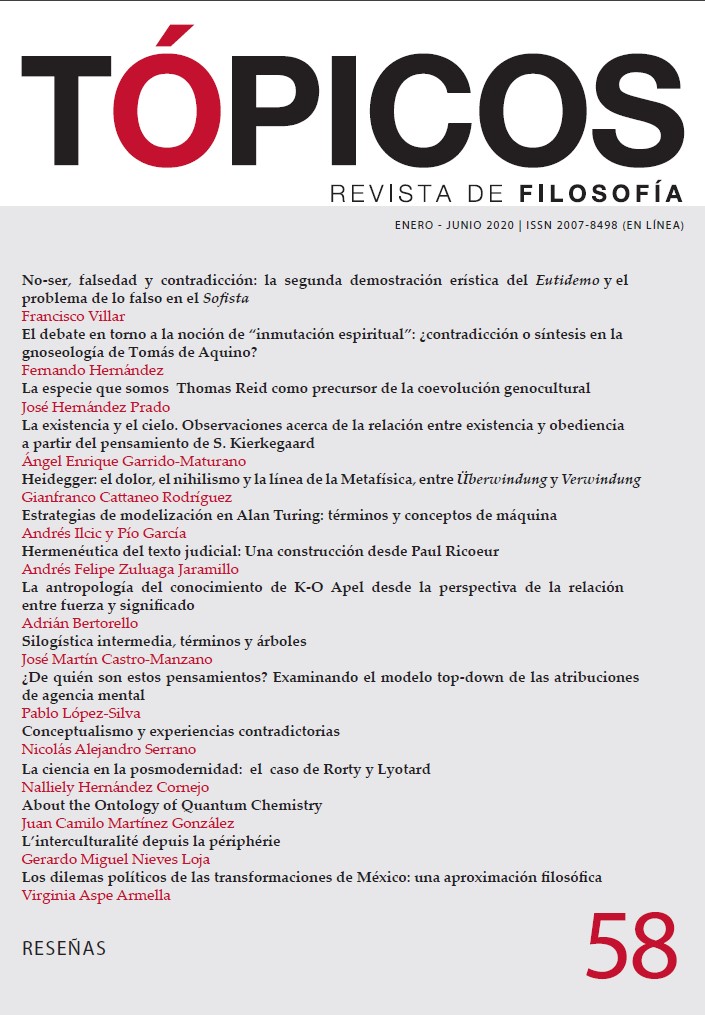Publicado 2019-12-13
Palabras clave
- neopragmatismo,
- posmodernidad,
- ciencia,
- Rorty,
- Lyotard
- poder,
- eficiencia ...Más
Cómo citar
Resumen
El objetivo de este trabajo consiste en contrastar las concepciones sobre la ciencia que desarrollan el filósofo norteamericano Richard Rorty y el filósofo francés Jean-François Lyotard en algunos de sus textos más conocidos. Para ello, primero mostraremos un panorama general del pensamiento posmoderno dentro del cual se ubican las propuestas de estos dos autores. A continuación, señalaremos algunos puntos de convergencia en sus respectivas perspectivas filosóficas y, en particular, epistémicas, para después señalar claras diferencias en su construcción filosófica de lo científico, su desarrollo y función social. Finalmente, intentaremos defender brevemente que la perspectiva de Rorty resulta más adecuada que la del francés de cara a enfrentar los retos actuales de la ciencia y para dar cuenta de su desarrollo histórico, pero que dicha perspectiva puede ser complementada y enriquecida por la crítica económica y política de éste último.
Referencias
- Aylesworth, G. (2015). Postmodernism. The Stanford Encyclopedia of Philosophy (Spring Edition), E. N. Zalta (ed.), URL = <https://plato.stanford.edu/archives/spr2015/entries/postmodernism/>.
- Calinescu, M. (1977). Faces of Modernity: Avant-Garde, Decadence, Kitsch. Bloomington: Indiana University Press.
- Crome, K. (2011). Paralogy. En S. Sim, (ed.), The Lyotard Dictionary. (pp. 159-160). Edinburgh: Edinburgh University Press.
- Curtis, N. (2011). Performativity. En S. Sim, (ed.), The Lyotard Dictionary. (pp. 162-163). Edinburgh: Edinburgh University Press.
- Foster, H. (1985). Introducción al Posmodernismo. En H. Foster, (ed.), La posmodernidad. (pp. 7-18). Barcelona: Kairós.
- Habermas, J. (1981). Modernity versus Postmodernity. New German Critique, 22, 13-14.
- Heisenberg, W. (1968). Quantum-theorical Reinterpretation of Kinematic and Mechanical Relations. En van der Waerden, B.L. (ed.), Sources of Quantum Mechanicas. New York: Dover.
- Jameson, F. (1985). Posmodernismo y sociedad de consumo. En H. Foster, H, La posmodernidad. (pp. 165-186). Barcelona: Kairós.
- Lechte, J. (2010). Cincuenta pensadores contemporáneos esenciales. Madrid: Cátedra.
- Lyotard, J.-F. (1987). La posmodernidad (explicada a los niños). Barcelona: Gedisa.
- Lyotard, J.-F. (2009). La diferencia. Barcelona: Gedisa.
- Lyotard, J.-F. (2012). La condición posmoderna. Madrid: Cátedra.
- Munz, P. (1987). Bloor’s Wittgenstein or the Fly in the Bottle. Philosophy of Social Sciences, 17, 67-96.
- Norris, C. (1997). Teoría Acrítica. Posmodernismo, intelectuales y la Guerra del Golfo. Madrid: Cátedra.
- Peters, M. (1989). Techno-Science, Rationality and the University: Lyotard on the “Postmodern Condition”. Educational Theory, 39(2), 93-105.
- Proctor, R. N. (1991). Value-Free Science? Purity and Power in Modern Knowledge. Cambridge: Harvard University Press.
- Rioja, A. (1995). Los orígenes del principio de indeterminación. Theoria, 10(22), 117-143.
- Rorty, R. (1993a). Wittgenstein, Heidegger y la reificación del lenguaje. En Ensayos sobre Heidegger y otros pensadores contemporáneos. Escritos filosóficos 2. (pp. 79-99). Barcelona: Paidós.
- Rorty, R. (1993b). Habermas y Lyotard acerca de la postmodernidad. En Ensayos sobre Heidegger y otros pensadores contemporáneos. Escritos filosóficos 2. (pp. 229-246). Barcelona: Paidós.
- Rorty, R. (1994). ¿Esperanza o conocimiento? Una introducción al pragmatismo. Ciudad de México: FCE.
- Rorty, R. (1996a). El idealismo del siglo XIX y el textualismo del XX. En Consecuencias del pragmatismo. (pp. 217-240). Madrid: Tecnos.
- Rorty, R. (1996b). Liberalismo burgués posmoderno. En Objetividad, relativismo y verdad. Escritos filosóficos 1. (pp. 276-296). Barcelona: Paidós.
- Rorty, R. (1996c). Conservando la pureza de la filosofía: ensayo sobre Wittgenstein. En Consecuencias del pragmatismo. (pp. 79-98). Madrid: Tecnos.
- Rorty, R. (1996d). Cosmopolitismo sin emancipación: Respuesta a Jean-François Lyotard. En Objetividad, relativismo y verdad. Escritos filosóficos 1. (pp. 285-298). Barcelona: Paidós.
- Rorty, R. (1996e). Objetividad, relativismo y verdad. Escritos filosóficos 1. Barcelona: Paidós.
- Rorty, R. (1996f). Pragmatismo sin método. En Objetividad, relativismo y verdad. Escritos filosóficos 1. (pp. 93-112). Barcelona: Paidós.
- Rorty, R. (1996g). Método, ciencia y esperanza social. En Consecuencias del pragmatismo. (pp. 274-296). Madrid: Tecnos.
- Rorty, R. (1996h). La indagación intelectual como recontextualización: una explicación antidualista de la interpretación. En Objetividad, relativismo y verdad. Escritos filosóficos 1. (pp. 131-153). Barcelona: Paidós.
- Rorty, R. (2000a). Daniel Dennett en torno a la intrinsicidad. En Verdad y progreso. Escritos filosóficos 3. (pp. 115-131). Barcelona: Paidós.
- Rorty, R. (2000b). Verdad y progreso. Escritos filosóficos 3. Barcelona: Paidós.
- Rorty, R. (2001). La filosofía y el espejo de la naturaleza. Madrid: Cátedra.
- Rorty, R. (2004). Philosophy-Envy. Daedelus, 133(4), 18-24.
- Rorty, R. (2010). La filosofía como género transicional. En Filosofía como política cultural. Escritos filosóficos 4. (pp. 163-188). Madrid: Paidós.
- Sim, S. (1998). Postmodernism and Philosophy. En The Routledge Companion to Potsmodernism. (pp. 3-14). New York: Routledge.
- Sim, S. (2011). Postmodern Science. En The Lyotard Dictionary. (pp. 186-187). Edinburgh: Edinburgh University Press. Suárez, J. O. (2005). Richard Rorty: el neopragmatismo americano. Medellín: Editorial Universidad de Antioquia.
- Vattimo, G. (2011). Posmodernidad: ¿una sociedad transparente? En En torno a la posmodernidad. (pp. 9-19). Madrid: Anthropos.
- Wellmer, A. (1988). La dialéctica de la modernidad y la postmodernidad. En J. Picó, (comp.), Modernidad y posmodernidad. (pp. 103-139). Madrid: Alianza.







